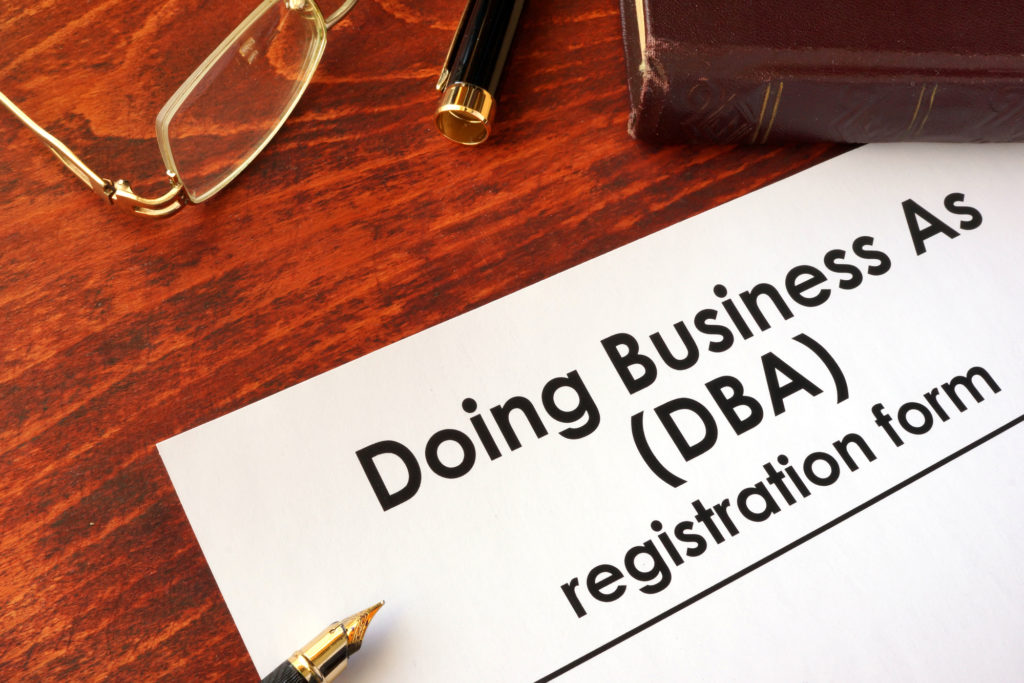
The Importance of a DBA
DBA stands for “doing business as,” but it is also commonly known as a trade name, fictitious name, or assumed name. Its purpose is to let a business operate under a name that is different to their formal business name, and it holds many benefits which will be explored below.
The U.S. Business Association advises that once you have decided on a unique and intriguing business name, it’s a good idea to safeguard it by registering it with the relevant authorities. They suggest choosing a name that is indicative of your brand identity and doesn’t stand in contrast to the services or goods that are on offer.
Once you’ve decided on what to name your business, the next step is protect it. This can be accomplished in four distinctive ways, each with a unique purpose. Some of these may be a legal requirement contingent on the business structure and where the business is situated.
In a nutshell, an entity name is a safeguard at state level, a trademark safeguards you at a federal level, a domain name safeguards your business website address, and although a DBA doesn’t provide legal safeguarding, it may be legally obligatory. While the above name registrations are legally autonomous from each other, most small businesses decide on the same name for each individual registration, even if it’s not generally obligatory.
What is the difference between a trade name and a trademark?
While tradename and trademark may seem strikingly similar, there is a distinct difference between the two. It’s trade name that means the same as DBA and signifies a businesses’ formal name. A trademark, on the other hand, gives the business’ brand a legal defence.
A trademark is your best defence at a national level to safeguard the name of your business, goods, and services. They are used to prohibit others from conducting business under the same or overly alike name as your own.
Trademark infringement is a serious matter and costs a lot of money. This is why it’s so incredibly important to make sure that your name is unlike any other. This can be accomplished by looking at the official trademark database, upheld by the United States Patent and Trademark Office.
When do I need a DBA?
A DBA is not a necessity in order to begin or operate a business, however it is often used by sole proprietorships, partnerships, LLCs and corporations for the purpose of branding.
In general, there are only two main reasons why a DBA might be required: if you have a registered official business entity hoping to branch out into novel products, services or brands, or if you’re seeking an over-all rebranding; or should be the owner of an unregistered business such as a sole proprietorship or a partnership and have the desire to conduct business under a name separate to your own. However, this should only be done if the business has extremely low profit and risk.
What are the benefits of a DBA?
These advantages vary contingent on the type of business structure that is being used. A significant aspect to consider is that for sole proprietorships and partnerships, registering a DBA name provides the same advantages as forming a Limited Liability Company (LLC) excluding personal liability protection.
As such, for sole proprietorships, the three primary advantages are as follows:
1. Branding.
If a sole proprietorship doesn’t use a DBA, then the owner conducts business in his/her own name and cannot market himself as anything differently.
2. Privacy.
The public doesn’t know your surname and is only familiar with the DBA.
3. Banking.
Receiving payment in the business’s name, rather than your own surname, grows trust and reliability. Furthermore, a DBA in addition to an Employer Identification Number (EIN) gives you the opportunity to open a business bank account which has numerous benefits.
Want to learn more about why you should get a DBA?
Learn more from TRUiC who offers in-depth explanations of what DBA’s are, why they are useful, and how to file for one in individual states.